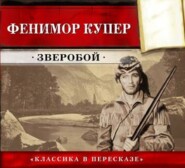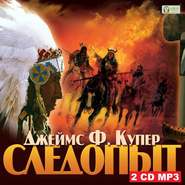По всем вопросам обращайтесь на: info@litportal.ru
(©) 2003-2024.
✖
The Spy: Condensed for use in schools
Настройки чтения
Размер шрифта
Высота строк
Поля
Every preparation being completed, Harper proceeded to take his leave. There was a mutual exchange of polite courtesy between the host and his parting guest; but as Harper frankly offered his hand to Captain Wharton, he remarked, in a manner of great solemnity:
“The step you have undertaken is one of much danger, and disagreeable consequences to yourself may result from it; in such a case, I may have it in my power to prove the gratitude I owe your family for its kindness.”
“Surely, sir,” cried the father, “you will keep secret the discovery which your being in my house has enabled you to make?”
Harper turned quickly to the speaker, and answered mildly, “I have learned nothing in your family, sir, of which I was ignorant before; but your son is safer from my knowledge of his visit than he would be without it.”
He bowed to the whole party, and without taking any notice of the peddler, other than by simply thanking him for his attentions, mounting his horse, and riding steadily and gracefully through the little gate, was soon lost behind the hill which sheltered the valley to the northward.
All the members of the Wharton family laid their heads on their pillows that night with a foreboding of some interruption to their ordinary quiet. Uneasiness kept the sisters from enjoying their usual repose, and they rose from their beds, on the following morning, unrefreshed and almost without having closed their eyes.
The family were already assembled around the breakfast table when the captain made his appearance, though the untasted coffee sufficiently proved that by none of his relatives was his absence disregarded.
“I think I did much better,” he cried, taking a chair between his sisters, and receiving their offered salutes, “to secure a good bed and such a plentiful breakfast, instead of trusting to the hospitality[36 - entertaining guests without pay.] of that renowned corps, the Cow-Boys.”
“If you could sleep,” said Sarah, “you were more fortunate than Frances and myself. Every murmur of the night air sounded to me like the approach of the rebel army.”
“Why,” said the captain, laughing, “I do acknowledge a little inquietude[37 - disturbed condition of mind.] myself. But how was it with you?” turning to his younger and evidently favorite sister, and tapping her cheek; “did you see banners in the clouds, and mistake Miss Peyton’s Æolian[38 - a stringed instrument that is caused to sound by the impulse of the air.] harp for rebellious music?”
“Nay, Henry,” rejoined the maid, “much as I love my country, the approach of her troops just now would give me great pain.”
The brother made no reply; when Cæsar exclaimed, with a face that approached something like the hues of a white man:
“Run, Massa Harry, run – if he love old Cæsar, run. Here come a rebel horse.”
“Run!” repeated the British officer, gathering himself up in military pride; “no, Mr. Cæsar, running is not my trade.” While speaking, he walked deliberately to the window, where the family were already collected in the greatest consternation.[39 - fright.]
CHAPTER IV.
CAPTAIN WHARTON’S CAPTURE
At the distance of more than a mile about fifty dragoons were to be seen, winding down one of the lateral[40 - from the side.] entrances of the valley. In advance, with an officer, was a man attired in the dress of a countryman, who pointed in the direction of the cottage. A small party now left the main body and moved rapidly toward the object of their destination.
On reaching the road which led through the bottom of the valley, they turned their horses’ heads to the north.
Reaching the dwelling of Birch, they made a rapid circle around his grounds, and in an instant his house was surrounded by a dozen sentinels.
Two or three of the dragoons now dismounted and disappeared; in a few minutes they returned to the yard, followed by Katy, from whose violent gesticulations[41 - signs or motions.] it was evident that matters of no trifling concern were on the carpet. A short communication with the housekeeper followed the arrival of the main body of the troop, and the advancing party remounting, the whole moved towards the Locusts with great speed.
As yet none of the family had sufficient presence of mind to devise any means of security for Captain Wharton; but the danger now became too pressing to admit of longer delay, and various means of secreting him were hastily proposed.
At length his sisters, with trembling hands, replaced his original disguise. This arrangement was hastily and imperfectly completed as the dragoons entered the lawn and orchard of the Locusts, riding with the rapidity of the wind; and in their turn the Whartons were surrounded.
The leader of the horse dismounted, and, followed by a couple of his men, he approached the outer door of the building, which was slowly opened for his admission by Cæsar.
A man, whose colossal[42 - very great.] stature manifested the possession of vast strength, entered the room, and, removing his cap, he saluted the family with a mildness his appearance did not indicate as belonging to his nature. His dark hair hung around his brow in profusion, though stained with the powder that was worn at that day, and his face was nearly hid in the whiskers by which it was disfigured. Still the expression of his eye, though piercing, was not bad, and his voice, though deep and powerful, was far from unpleasant. Frances ventured to throw a timid glance at his figure as he entered, and saw at once the man from whose scrutiny Harvey Birch had warned them there was so much to be apprehended.
“You have no cause for alarm, ladies,” said the officer; “my business will be confined to a few questions, which, if freely answered, will instantly remove us from your dwelling.
“Has there been a strange gentleman staying with you during the storm?” continued the dragoon, speaking with interest.
“This gentleman – here – favored us with his company during the rain, and has not yet departed.”
“This gentleman!” repeated the other, turning to Captain Wharton. He approached the youth with an air of comic gravity, and, with a low bow, continued, “I am sorry for the severe cold you have in your head, sir.”
“I!” exclaimed the captain, in surprise; “I have no cold in my head.”
“I fancied it, then, from seeing you had covered such handsome black locks with that ugly old wig. It was my mistake; you will please to pardon it.”
Mr. Wharton groaned aloud; but the ladies, ignorant of the extent of the visitor’s knowledge, remained in trembling yet rigid silence. The captain himself moved his hand involuntarily to his head, and discovered that the trepidation of his sisters had left some of his natural hair exposed. The dragoon watched the movement with a continued smile, when, seeming to recollect himself, turning to the father, he proceeded:
“Then, sir, I am to understand there has not been a Mr. Harper here within a week?”
“Mr. Harper,” echoed the other; “yes – I had forgotten; but he is gone, and if there be anything wrong in his character, we are in entire ignorance; to me he was a total stranger.”
“You have little to apprehend from his character,” answered the dragoon, dryly; “but he is gone – how, when, and whither?”
“He departed as he arrived,” said Mr. Wharton, gathering renewed confidence from the manner of the trooper, “on horseback last evening, and he took the northern road.”
The officer listened with intense interest, his countenance gradually lighting with a smile of pleasure, and the instant Mr. Wharton concluded his laconic[43 - using but few words.] reply he turned on his heel and left the apartment. In a few moments orders were given to some of the troop, and horsemen left the valley, at full speed, by its various roads.
The suspense of the party within, who were all highly interested witnesses of this scene, was shortly terminated; for the heavy tread of the dragoon soon announced his second approach. He bowed again politely as he reëntered the room, and, walking up to Captain Wharton, said with mock gravity:
“Now, sir, my principal business being done, may I beg to examine the quality of that wig?”
The British officer imitated the manner of the other, as he deliberately uncovered his head, and handing the wig observed, “I hope, sir, it is to your liking.”
“I cannot, without violating the truth, say it is,” returned the dragoon; “I prefer your ebony hair, from which you seem to have combed the powder with great industry. But that must have been a sad hurt you have received under this enormous black patch.”
“You appear such a close observer of things, that I should like your opinion of it, sir,” said Henry, removing the silk, and exhibiting the cheek free from blemish.
“Upon my word, you improve most rapidly in externals,” added the trooper; “if I could but persuade you to exchange this old surtout[44 - overcoat.] for that handsome blue coat by your side, I think I never could witness a more agreeable metamorphosis,[45 - change.] since I was changed myself from a lieutenant to a captain.”
Young Wharton very composedly did as he was required, and stood an extremely handsome, well-dressed young man. The dragoon looked at him for a minute with the drollery that characterized his manner, and then continued:
“This is a newcomer in the scene; it is usual, you know, for strangers to be introduced; I am Captain Lawton, of the Virginia horse?”
“And I, sir, am Captain Wharton, of his Majesty’s Sixtieth regiment of foot,” returned Henry, bowing stiffly, and recovering his natural manner.
The countenance of Lawton changed instantly, and his assumed quaintness vanished. He viewed the figure of Captain Wharton, as he stood proudly swelling with a pride that disdained further concealment, and exclaimed with great earnestness:
“Captain Wharton, from my soul I pity you!”
“Oh, then,” cried the father, in agony, “if you pity him, dear sir, why molest him? He is not a spy; nothing but a desire to see his friends prompted him to venture so far from the regular army, in disguise. Leave him with us; there is no reward, no sum, which I will not cheerfully pay.”
“Sir, your anxiety for your friend excuses your language,” said Lawton, haughtily; “but you forget I am a Virginian, and a gentleman.” Turning to the young man, he continued, “Were you ignorant, Captain Wharton, that our pickets have been below you for several days?”
“I did not know it until I reached them, and it was too late to retreat,” said Wharton, sullenly. “I came out, as father has mentioned, to see my friends, understanding your parties to be at Peekskill,[46 - on the Hudson, forty miles north of New York.] and near the Highlands, or surely I would not have ventured.”

















